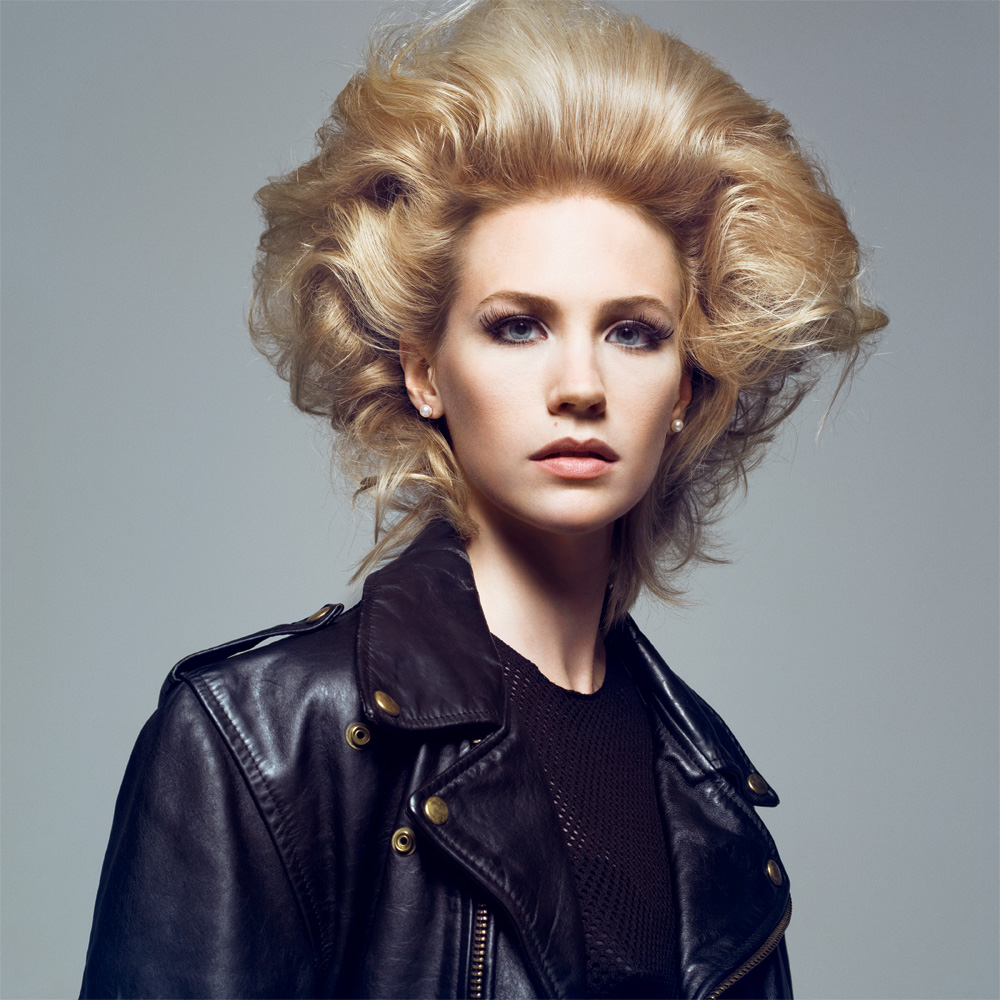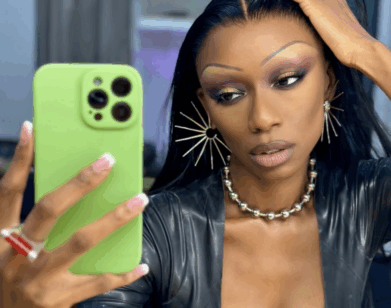January Jones
In retrospect, it seems strange that a television series like Mad Men—a period piece set in the early 1960s about guys who work in advertising—would become a cultural touchstone of the late-early ’00s. For one thing, Don Draper, the show’s murky protagonist—a seemingly prototypical Man in the Gray Flannel Suit played by Jon Hamm—is almost willfully difficult to know, much less like. He is probably one of the most complicated characters to appear on television in the last two decades, running neck-and-neck with Tony Soprano (whom Mad Men creator Matthew Weiner also had a hand in sculpting as a producer on The Sopranos). Draper is a man who is very clearly living in his moment, but as the coming revolutions of race, sex, culture, and Vietnam begin to wend their way into view, that moment seems destined to pass. As Don himself says near the end of the second season, “I’ve been watching my life. I keep scratching at it, trying to get into it.” So, too, has the audience, as Don has struggled to hold together the ever-unfurling existence that he has invented for himself and flashes of the man inside have been revealed in the mode of a painstakingly slow striptease . . .
Fans of Mad Men are used to hearing Don employ romantic soliloquies like that to pitch clients on his ideas for how to sell things like cigarettes and coffee and slide-projector carousels. But here we might offer a different kind of pitch: That for all his furrowed brows and ponderous, smoky, what-does-it-all-mean glances, Don Draper is the red herring of Mad Men, and the show’s real action surrounds his wife, Betty, played with aplomb by January Jones. The preponderance of evidence is hard to overlook: While Don wears the idea of his own character as an allegory for the fallacies and facades of mid-century America as easily (and well) as he does his suits, Betty negotiates it all like she’s being slowly submerged in a bath of scalding hot water, constantly trying to hold back the screams. Even in his worst moments, Don somehow manages to keep up the old movie-star vibe and look stylishly askew. But real life, like Betty, is more often strange and messy. Her alabaster skin, icy blue eyes, and set-and-sprayed blond hair betray a sort of inner conflict that’s quietly escalated into a kindemotional mushroom cloud. She has ideas—about how people should act and how life should be—that are clearly not her own, and yet she’s always judging, judging, judging. But the main difference between Don and Betty is that she really believes in it all—her perfect-looking family, her suburban life, the overarching values of the world in which she lives—and the way she slowly breaks down as she watches everything get pulled apart, degraded, and even destroyed is what hints at the existence of some sort of living, beating heart at the core of the show. And then, in the moments when Betty snaps, like at the end of the first season, when she shoots her neighbor’s homing pigeon or gives themixed-up 9-year-old son of the neighborhood divorcée a lock of her hair, or during thesecond season, when she accuses Don of having an affair and wanders around the house in a cocktail dress for two days, or when she’s told by a man at a riding club to whom she’s attracted that she looks sad and responds, “My people are Nordic.” . . . Well, those are the reasons to watch Mad Men.

With the third season of Mad Men about to kick off this month on AMC, the 31-year-old Jones recently sat down in Los Angeles with none other than Jack Nicholson to discuss, among other things, what makes Betty Draper—and the actress who plays her—tick.
Jack Nicholson: Why did you want me to do this interview?
January Jones: Because after you called me to say that you appreciated my work in the first season of Mad Men, you said that I shouldn’t do too many interviews because the show is going to get bigger. So I thought it was ironic that you agreed to do this one.
Nicholson: You said on the phone that you wanted me to do it because you thought I would be curious about the same thing as the average person—and that I wouldn’t ask you who you were dating.
Jones: Yeah.
Nicholson: But that’s what people want to know.
Jones: I guess.
Nicholson: So is your name January because you were born then?
Jones: It’s a coincidence. It’s from a book called Once is Not Enough by Jacqueline Susann. Bad book.
Nicholson: Who read it?
Jones: My mom, but they made the book into a TV movie and my dad watched it with her. My dad liked how January went with Jones. My sisters’ names are Jina and Jacey Jones.
Nicholson: It’s great to have a name that you didn’t have to change when you became an actor.
Jones: People think that I changed my name. I could’ve been an actress, a superhero, or a stripper.
Nicholson: Sounds like a singer at the Interlude. A jazz singer.
Jones: There was an old singer named January Jones. Richard Curtis [who directed Jones in the film The Boat That Rocked, out this month] sent me a picture from London. It was on a marquee from an old theater. It was a second billing, but it said, Singing tonight: January Jones. The picture was from the ’40s or ’50s, so maybe she was a jazz singer.
Nicholson: Okay, so let’s get down to it. Why are you doing this?
Jones: The interview or the job?
Nicholson: The interview.
Jones: Because I play this passive character on Mad Men. She’s very 1960s–ish and Grace Kelly–ish.
Nicholson: She’s more than Grace Kelly-ish. This is a turn on the classic Grace Kelly character. Call her a “Hitchcock blonde”—although this particular blonde that you play is slightly cracked.
Jones: She is cracked, which is why I love her.
Nicholson: And her idiosyncrasies and individuality. It touches the area of sexual icons. You are playing a sexual archetype on Mad Men.
Jones: I thought this show would be an opportunity for people to see me as something else, something darker. Betty is such an interesting character. Now, I might not be interesting . . . [laughs]
Nicholson: You’ve had some very strong, intimate moments in Mad Men. Do you prepare differently for those days?
Jones: I honestly get more nervous when it comes to the emotional, less physical scenes. Betty is always feeling one thing but then goes and does something completely different. She goes through a bunch of different emotions that I act more with my face than through what I’m saying. But the physical is just physical.
Nicholson: The physical is just physical?
Jones: Yeah. If she’s going into a bar and decides to sleep with someone, like she did at the end of the second season, that is kind of shocking to some people . . . You know, she has been judging everyone, and then she makes this spontaneous move. When I read the script and saw that she decided to cheat on her husband after all that has happened to her, I was kind of confused. So I asked Matthew Weiner [the creator of Mad Men] about that scene—I said, “What is she doing? Is she getting revenge?”—and he said, “Stop thinking about anything. It could be that the world is falling apart or maybe she’s just horny. She’s pregnant and she’s falling apart, so she sleeps with a guy. You don’t have to think about it.”
I have that thing in my stomach where I just need to keep striving for things. In my mind, I want the fairy tale.January Jones
Nicholson: How’d you like that answer?
Jones: It fucked with me to be honest. [both laugh] It happens a lot on the show—the pace is so fast. We get the scripts two days before we’re going to shoot them. I don’t have time to think about it. I’ve never been trained as an actress, so it’s all instinct. I just let myself go into this kind of a free fall. Sometimes I feel scared, or out of my element—like everyone else knows what they’re doing but me. I don’t know . . . Maybe I function well with fear or I like to be faced with a challenge . . . I think I’m just a work in progress.
Nicholson: It’s all a work in progress. That’s the luxe of the job, isn’t it?
Jones: It’s the same with life. If everything always went perfectly, I would feel like, When is the ball going to drop? Because good things don’t always last. Maybe I’m a pessimistic person. When something just seems too good, I can’t believe it. I come from a background where I was never told that I couldn’t do something, so I’m very stubborn. I don’t know if I believe in fate or destiny, but it kind of feels that way sometimes.
Nicholson: What about advertising? How do you relate to the subject of the show?
Jones: I don’t relate to it at all. It seems like the toughest job in the world—both then and now. The difference back then was that these ad guys were rock stars. We have people who do the research on the show—Bob Levinson does a lot of it. He used to be one of those ad guys in the ’60s before he was an agent, and you kind of see the obstacles these guys faced a little bit in the second season of Mad Men: “These kids don’t drink coffee any more. How we going to market coffee? How are we going to market cigarettes when people know that they’re dangerous?”
Nicholson: Did you ever read The Hidden Persuaders [1957]? That was the book on advertising from the period, which was all about the subliminal element. One of the things they talk about is the way it’s comforting to people to think of themselves as a machine, so when they see an image of a little Bayer aspirin go through the pipes and the plumbing inside, what’s really being subliminally sold is that solace.
Jones: It’s about trying to make people feel like they want something that they don’t know they want. I should read that book.
Nicholson: What about the fashion of Mad Men?
Jones: The fashion on the show?
Nicholson: Well, what men found attractive in the early ’60s . . .
Jones: I think men are still attracted to what they’ve always found attractive, which is a woman [both laugh] who is feminine, soft, real, and . . . womanly. In the time of Mad Men, women were very polite and soft-spoken, and they didn’t express a lot of opinions. Now, I think women have become a little more rigid or hard—and I don’t think it’s because of men. I think it’s because women have become more masculine or we’ve forced ourselves to become more masculine. What’s in fashion now is very thin and hard.
Maybe I function well with fear or I like to be faced with a challenge . . . I think I’m just a work in progress.January Jones
Nicholson: Well, if there was such a thing as the battle of the sexes and the object of the battle is to win, then as the general for the men, I would say, “Hey, just give them what they want. It’s the easiest win you’ll have.”
Jones: [laughs] And we sure did win. I think what’s great about the show is that, just in terms of fashion, it has helped bring a certain silhouette back. That womanly, cinched waist . . . I mean, a year before Mad Men came out, everything was very boxy and sort of shapeless. Now, as much as I hate getting into my girdle every day for the show, it’s brought that beautiful line back. You think of a lady when you see it. It’s kind of refreshing. You don’t have to give up your femininity to be a powerful woman.
Nicholson: And then, after that period when the show takes place, the women’s movement said, “Take off your bra!” etc.
Jones: That was a tangible way to say, “I’m not going to be held under these constraints of being a woman.” And so, in an act of defiance, women took off all their physical restraints—their girdles and their bras. That was a way of setting it right on the table.
Nicholson: Growing up in the household I grew up in, it was certainly a myth that strong, outspoken women were not admired—and not just in my own household, but in the community.
Jones: I think Don Draper’s storyline on Mad Men shows that. He’s married this woman who he thinks is the perfect woman and someone he should love. She looks right, acts right, doesn’t say too much. But then he’s sexually attracted to very outspoken, independent women.
Nicholson: Speaks to the paradox.
Jones: Right. So some men don’t want their women to speak up, and then other men are attracted to that very thing. But as a woman, you don’t want to be just window dressing. I’ve probably been unattractive to some men because I do say what I feel and what I think. You can be political about it, but I don’t have a red flag. I don’t have a mechanism in my head that prevents me from saying what I think, or if something upsets me or if I feel like I’m being degraded. I come from a family of very outspoken women. I can’t imagine living in a time when you couldn’t express what you felt. That’s why Betty does what she does. She’s imploding to the point where she gets so frustrated that she does something wacky.
Nicholson: That’s why, every once in a while, she shoots a bird because she doesn’t know what else to do. [laughs]
Jones: If I was living back then, I think I would have been a bit rebellious. But Betty’s whole thing is that she’s doing what she thinks she should do. She’s living her life the way she thinks she should live it . . . I suppose I do that, too. I’m from a small town [Sioux Falls, South Dakota], so I guess I think I should be married and have kids. I also think I should be juggling a career. But I don’t have a lot in common with Betty or the way she handles things. With her, it’s all a façade. It’s interesting, though, that in terms of education, marriage, jobs—women are still not where they should be. Women still get paid less. Women still . . . [laughs] whatever. But even though things are better now than they were before, I think women of my generation take a lot for granted.
Nicholson: What are some things that women now take for granted?
Jones: Things like getting to go to an Ivy League school, getting work as a high-powered businesswoman or as a studio executive. Anything you would think.
Nicholson: What is success to you?
Jones: Well, success for me is to feel happy—80 percent of the time. That’s been my goal in life. I think that comes from my father. He’s a very optimistic, happy person. I’m not quite sure if I’ll ever feel this, but I want to know how to be happy. I’m happy when I’m at work. I’m happy when I’m with my family or my dog. But, you know, there’s always that feeling of, I’m not satisfied. I have that thing in my stomach where I just need to keep striving for things. In my mind, I want the fairy tale.
Nicholson: So how did you get to L.A.?
Jones: Well, I first went to New York when I was 18, and I did some modeling and commercials. A modeling scout had come to Nebraska and found me. My mom and I had been out shopping for a dance. We were told to go to this big place—it was like a modeling school, I suppose.
Nicholson: Who told you to go to this modeling school?
Jones: This guy. He must have been Italian. [Nicholson laughs] He had an agency in New York. They told my mom, “We’d love to have your daughter come to New York.” And so my mom checked it out, and it was legitimate, but she told me I had to finish high school and turn 18 before I could go. So I hurried up and finished high school almost a year early. Three days after I turned 18, I went to New York. Didn’t know anybody. Didn’t have any money. I had $200.
Nicholson: How was the trip?
Jones: I went on an airplane—the second airplane I’d ever been on. We drove to Omaha from South Dakota and flew from there. I was supposed to stay four months and then come back and go to college.
People think that I changed my name. I could’ve been an actress, a superhero, or a stripper.January Jones
Nicholson: Okay, so you’re on the plane and you’re looking at the country below you . . . What’s that like?
Jones: I was excited to start my life—to start seeing the world and living life. It’s that feeling when you’re young and starting out and there’s no fear . . . I couldn’t do it now, just pick up and move. But back then, it felt exciting. It was my way to get somewhere. I did some work in some magazines—enough to pay rent—and I got to travel a little. When I finally got to Manhattan, when I was in my place, I got a little nervous. The modeling agency put me in this apartment near the Empire State Building, so I went down to a pizza joint to get food for dinner, and I ordered an orange pop. The guys at the pizza place looked at me like I was crazy because in New York, people don’t say “pop.”
Nicholson: I bet they were real sweet about it.
Jones: They were like, “You want a Fanta? Because we don’t sell sounds.” [both laugh] I was very naïve and talking to everybody. And then I very quickly learned to shut down.
Nicholson: You figured it out.
Jones: I figured it out. Then I went to Paris for a little while and learned how to shut down even more. That’s when I got into my introspective, moody period, writing in my journal and going to visit Jim Morrison’s grave.
Nicholson: Jim Morrison’s grave is at Père-Lachaise cemetery. Who else is there with him?
Jones: A lot of famous people, but I didn’t get to see them all. There are people there who I’d go see now.
Nicholson: Something to look forward to.
Jones: The next time I randomly go to Père-Lachaise cemetery . . . [laughs]
Nicholson: So you said something earlier about fate. Do you have a big belief system?
Jones: Well, I feel déjà vu a lot. Someone said that means that you’re living your life the right way because maybe you have foresight, because then, when something actually happens, it feels like déjà vu. I like to think of it that way.
Nicholson: There are a lot of explanations for it.
Jones: I just feel like there have been so many moments in my life where I’ve had like three dollars to my name, and just before I’m going to call home and say, “I need to come back,” something happens—something falls in my lap. Even up to five years ago, that’s happened. The minute I think L.A. is beating me down or I’m not going to get another job, something wonderful happens.
Nicholson: What was your first acting meeting?
Jones: It was with the casting director Mali Finn, who has since passed away. It was for Wonder Boys [2000] with Michael Douglas. I had just come to L.A., and I met my manager within a week through a commercial agent. I was very lucky because I was naïve, and I could have met someone terrible who would have put me in the wrong rooms. But he’s still my manager.
Nicholson: You’re both lucky.
Jones: Very. I think luck is a big part of people who are successful in this town. I remember going into one audition . . . I wear contacts now, but I used to wear glasses just because I have an astigmatism. So I went into an audition, and this woman said, “You know, your instincts are good, but you’ve got a crazy eye.” And I said, “Crazy eye?” It crushed me. I thought, “This is it. I have a crazy eye. I’m screwed.” But I think one of the biggest steps for me was having confidence in an audition room. Walking in, feeling like I’m not going to mess things up . . .
Nicholson: Not messing up—that’s what you think of as confidence?
Jones: Is that bad?
Nicholson: No. [both laugh] How’d you feel the first time they called you up and said you got the part in All the Rage [1999]?
Jones: Well, euphoric. It wasn’t even a speaking role. But being on a set with a trailer, it felt like things were starting to happen. It felt good. But then, slowly, you start all over again. I always thought that at some point in my career I would feel safe. I would feel like, “Okay, now I’ve made it, and I don’t need to fight anymore.” And now I know that the fights just get harder.
Nicholson: Well, chance is always a factor.
Jones: But you’re always fighting for something. There’s always a struggle. And I guess that’s good. It shouldn’t be easy. But I thought at some point that maybe that it would feel easier.
Nicholson: And things don’t?
Jones: Not quite yet. I mean, with the success of Mad Men, I get more offers. But a lot of them are for the sad housewife.
Nicholson: Do you see your career in terms of having a strategy?
Jones: I never really thought of having a strategy. I probably should have one. I mean, I’ve already been doing this for 13 years and I still feel like a newbie.
Nicholson: A what?
Jones: A newbie—someone who is new at this.
Nicholson: So, now, here you were, being in Anger Management [2003, which starred Adam Sandler and Nicholson] and then you have this film, The Three Burials of Melquiades Estrada [2005], that goes to the Cannes film festival and . . . Boom! You’re across the ocean in France.
Jones: Going to Cannes was probably one of the most wonderful experiences of my life. It felt like I was in To Catch a Thief [1955] or something. I went to dinner at . . . I can’t remember the name of the restaurant, but it’s where they have the good bouillabaisse. And they were playing Fellini music, and I was sitting among all these people that I admire. I felt like, “I could do this. I’m in it.” And Three Burials did well at the festival.
Nicholson: Good movie.
Jones: Tommy Lee Jones directed it. He’s probably my favorite director I’ve worked with so far. The experience really made me feel like I was an actor. Also, at the end of the day, you’re going to Cannes, you’re among photographers wearing an amazing dress and diamonds . . .
Nicholson: Did you do any interviews?
Jones: Yeah, we did a lot of press, but there was a very respectful tone to everything. It was mostly about the filmmaking. It wasn’t, “Tell us about hijinx on set!” But there was a bit of a language barrier, so a lot of my answers were very short.
Nicholson: So you didn’t get a chance to say that you hated doing interviews?
Jones: [laughs] No. I think people kind of feel that from me, though. This one is fun. I don’t feel like I’m getting trapped into saying something.
This is an excerpt of the August cover story. To read the full January Jones interview pick up a copy of Interview.
Acclaimed actor Jack Nicholson is the recipient of three Academy Awards. He holds honors from the American Film Institute and the John F. Kennedy Center.







